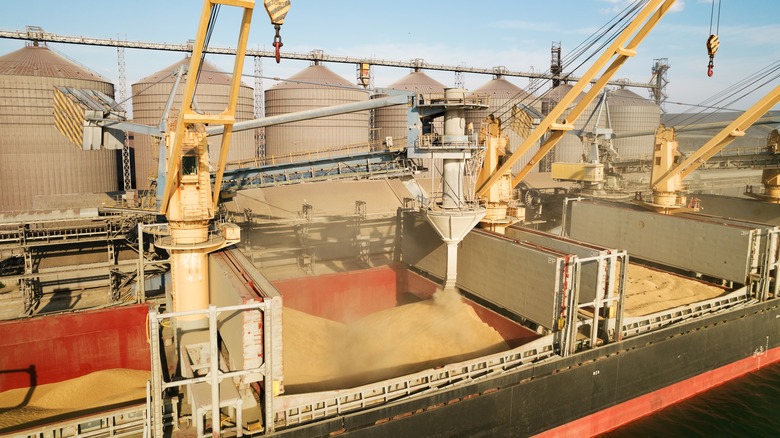How Japan Is Helping Ukraine End The Global Wheat Shortage
The 2022 worldwide wheat and grain shortage spawned by Russia's invasion of Ukraine in February continues to impact nations across the globe. Reduced supplies and soaring prices hit hard, especially in the 36 out of 55 food-crisis countries that depended heavily on wheat imports from Ukraine and the Russian Federation in 2021, according to the Food and Agricultural Organization of the United Nations (FAO). The crisis is multi-pronged, and solutions are slowly evolving.
Roman Slaston, a Ukrainian farmer and general director for the Ukrainian Agribusiness Club explained to NPR that the wheat and grain crops are crucial for feeding the Ukrainian people but also for exporting. As one of the top five global grain exporters, per the FAO, Ukraine's inner struggles are consequential. But the tangled web of inter-lapping issues as of July 2022 dig deep. They currently center on port blockages and grain storage capacity, which in turn complicate production. That's where Japan enters the conversation — and becomes part of the solution.
Japan and FAO seek Ukrainian wheat solutions
In early June 2022, NPR reported through its podcast, "The Indicator," that 20 million tons of wheat and grain exports were trapped inside Ukrainian borders due to the Russian invasion and naval blockades. Almost all the 60 million tons of annual Ukrainian grain exports traditionally go through seaports — but that came to a screeching halt. The effects have devastated Ukrainian farming families and the global food supply, leading to intervention by the FAO and funding by Japan.
The blockaded Black Sea ports ultimately left 18 million tons of 2021 grain harvests in storage, according to the Ministry of Agrarian Policy and Food of Ukraine, per the FAO. That equates to 30% of filled Ukrainian storage space before the potential 60 million tons of harvested grain in the upcoming July/August season. To face this problem head-on, the FAO has now launched a $17 million project to help with grain storage, exports to international markets, and future production capacity.
With Japan's $17 million in funding, storage deficits will be decreased on multiple levels, explains Pierre Vauthier, Head of FAO Ukraine Country Office. Support for farmers in 10 regions includes the provision of polyethylene grain sleeves for storage, grain loading machinery, and modular storage containers. Funding is also slated for alternative grain transportation routes, laboratory expansion, and international food-safety standards.
Japan previously provided funding in April for Ukraine's FAO Humanitarian Response Programme, bring its total Ukrainian crisis contribution to $20 million, per the FAO.

